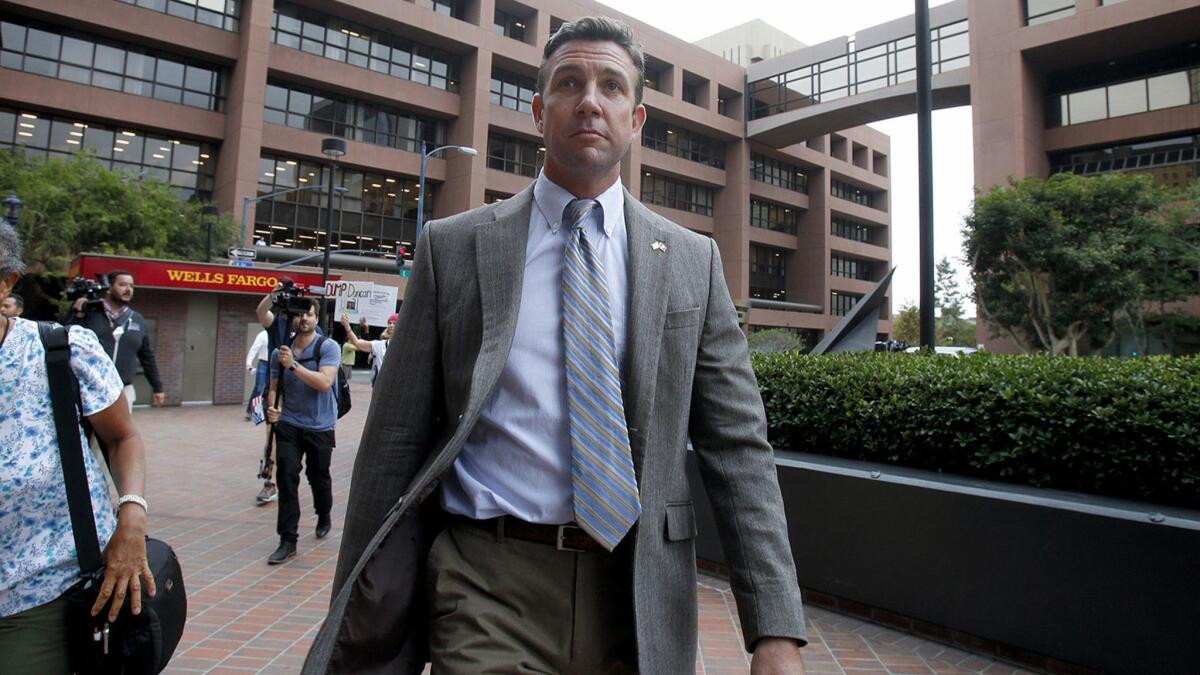Defense contractors and uncle’s associate help pay Rep. Duncan Hunter’s legal bills

Nine donors, including at least two who had already reached political contribution limits, gave $30,800 in the last quarter of 2018 to help pay for Rep. Duncan Hunter’s legal defense, a new financial report shows.
The Republican congressman representing Alpine and his wife and former campaign manager, Margaret, faced criminal investigations into their alleged use of political money for personal purposes. The two were indicted in August and have pleaded not guilty to all 60 charges.
The special fund for Hunter’s legal expenses is administered by a trustee and is separate from his political campaign treasury, which has already paid at least $682,100 to lawyers since June 2016.
The quarterly financial report for Hunter’s legal expense fund was released to the San Diego Union-Tribune by the Citizens for Responsibility and Ethics in Washington. The report, which covers fundraising and spending from Oct. 1 through Dec. 31, shows $30,800 in itemized contributions and no spending.
The legal fund was established in March. In total, it has received at least $60,800 and spent at least $27,062. The fund has not reported any expenditures since June.
A spokesman for Hunter’s congressional office did not respond to questions and requests for comment starting Tuesday afternoon.
Hunter’s campaign has been under scrutiny since April 2016 for a series of expenses questioned by the Federal Election Commission and reported by the San Diego Union-Tribune.
In response, Hunter reimbursed his campaign for more than $60,000 in mistaken, personal or undocumented expenditures including video games, oral surgery, private school tuition, a garage door, a family trip to Italy and airfare for a pet rabbit.
Personal use of campaign money — defined as use of political money to cover expenses that would exist regardless of a candidate’s campaign or official duties — is illegal, to guard against undue influence by donors whose bottom line can be affected by decisions in Congress.
Legal expenses arising from campaign or official activity are not considered personal use under federal law, and spending money from campaign coffers and legal expense funds to pay for such costs is permissible.
The funds create a way for donors who have already met campaign contribution limits to give up to $5,000 more to help lawmakers out of legal trouble — a favor lawmakers are likely to remember if the donor comes calling for help someday, said Jordan Libowitz, a spokesman for Citizens for Responsibility and Ethics in Washington.
But unlike campaign finance reports, information about the legal funds is not readily available online and more easily avoids public scrutiny.
“For some very rich donors, legal defense funds give a second bite at the apple, after they have already given a candidate the maximum donation allowable by law,” Libowitz said. “Because you have to show up in person to Congress to request a physical copy of each filing, most people do not know who is giving to support a scandal-plagued lawmaker.”
As of June 30, Hunter’s legal expense fund had been bankrolled primarily by people and subsidiaries connected to large companies that work on multimillion-dollar contracts for the federal government, disclosure reports show.
Donors connected to the family-owned shipbuilding company Edison Chouest Offshore — who have been among Hunter’s top campaign supporters for years — contributed almost half of the fund’s total revenue in 2018, according to fund and Federal Election Commission records.
In the last quarter of the year, the fund received contributions of $5,000 from five donors, including Linden Blue, vice chairman of the military contractor General Atomics; Tyler A. Lowrey, a member of the board of directors for Litel Instruments, a technology company founded by Hunter’s uncle Robert O. Hunter, Jr., who chairs its board of directors; and Gene W. Ray, co-founder and former chief executive officer of the multibillion-dollar defense contractor Titan Corp.
Lowrey and another donor, real estate developer Forrest W. Brehm, contributed $5,000 to the fund after they had already given the maximum $2,700 to Hunter’s campaign for the 2018 general election, according to FEC records.
Ray was Titan’s CEO when the company agreed in 2005 to pay $28.5 million to settle criminal and civil charges stemming from allegations that it bribed the president of the West African nation of Benin in an attempt to get business, according to news coverage at the time.
Ray now serves as managing director of GMT Ventures, a consulting company for technology and defense companies in the early stages of development. He also serves in advisory roles for numerous companies.
Ray and Blue did not respond to the Union-Tribune’s requests for comment. Lowrey and Brehm declined to comment.
Another donor, Quang X. Pham, a Jacksonville Beach, Fla., businessman and U.S. Marine Corps veteran, told the Union-Tribune he contributed $1,000 to Hunter’s legal expense fund because, years ago, Hunter supported him in his unsuccessful, underdog race for a congressional seat in Orange County at a time when the Republican Party was backing another candidate.
“I don’t know if he’ll be convicted or not, but I know that when I needed someone to support me at an event, he stepped up,” Pham said.
If Hunter is convicted, it will be a different story, Pham said, but for now, “I support him without any judgment because it feels right to do it … just like it felt right to him to support me nine years ago.”
Hunter’s criminal trial is scheduled for September.
Morgan Cook writes for the San Diego Union-Tribune.
More to Read
Get the L.A. Times Politics newsletter
Deeply reported insights into legislation, politics and policy from Sacramento, Washington and beyond. In your inbox three times per week.
You may occasionally receive promotional content from the Los Angeles Times.







